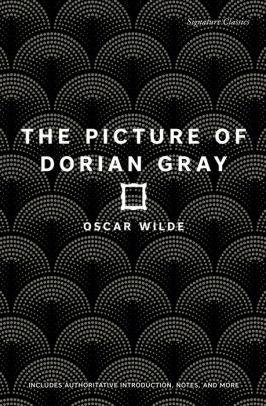Title: The Picture of Dorian Gray
Author: Oscar Wilde
Released: June 01st, 1890 (Paperback)
Trigger Warnings: Ableism, animal death (hunting scene), antisemitism, blood, death, drugs, fatphobia, misogyny, murder, racism, sexism, suicide
Rating: ★★★★★
Why Haven’t I Read This Before: I hadn’t heard of this until I was a younger adult, truthfully, but it was mostly in passing. I’ve heard of Oscar Wilde but now that I could, I wanted to check this out!
Description: Written in his distinctively dazzling manner, Oscar Wilde’s story of a fashionable young man who sells his soul for eternal youth and beauty is the author’s most popular work. The tale of Dorian Gray’s moral disintegration caused a scandal when it first appeared in 1890, but though Wilde was attacked for the novel’s corrupting influence, he responded that there is, in fact, “a terrible moral in Dorian Gray“. Just a few years later, the book and the aesthetic/moral dilemma it presented became issues in the trials occasioned by Wilde’s homosexual liaisons, which resulted in his imprisonment. Of Dorian Gray’s relationship to autobiography, Wilde noted in a letter, “Basil Hallward is what I think I am: Lord Henry what the world thinks of me: Dorian what I would like to be — in other ages, perhaps”.
Please keep in mind that this review contains spoilers for the entire book. Read with caution. If you click on “Read More”, it is under the assumption you either don’t care about spoilers or you’ve already read the book.
When reading this book, I hadn’t expected it to be as short as it was. There was so much to say about youth, beauty, nature vs nurture, art, and even consumerism to some degree. And how easily one could be influenced by a so-called friend if only because that friend has the most confidence in whatever they believe in or said.
One thing that’s interesting to me about this story is how wildly different each interpretation of Dorian is. Some can argue he was always innocent; Lord Henry corrupted him. Some can say that Dorian had always had it in him and even if Lord Henry said nothing. If I were to think about it for myself, I understood it as Dorian, knowing how beautiful he is because there’s no way he wasn’t told in a world like that, had an innocence and ignorance about him to a degree. Rather than one extreme or another, I believe that Dorian lies more in the middle; he’s abused by his grandfather and Lord Henry was an older gentleman who showed a type of kindness and mentoring to him that his grandfather never showed him.
And I think that’s why he was so taken by Lord Henry. After all, I see a lot of parallels to the young men of today falling for incel and “alpha” rhetoric so easily. I’ve always believed that Dorian understood what Lord Henry was about; he agreed to him to some degree but I also think because Dorian was abused, that led him to put Lord Henry’s words on a pedestal. And had Dorian justify all of the horrible and pleasurable actions he’s committed. If people died, he had nothing to do with it, not really, even by his own hand.
Still, I loved this story not just because of how it explores the darker side of humanity, but how Dorian became his own downfall. He wanted to do everything in his power to protect his “self”, literally, and more importantly, his “beauty” and what “goodness” he believed he had. Even with all the violence, horror, depravity he’s committed.
Granted, the artist was a good person. He fell in love with Dorian, despite the fact how corrupted Dorian had become because of Lord Henry and whatever notions already ruminate in his head.
So the question is – if Basil is how Oscar Wilde saw himself, if Lord Henry is what the world thought (or rather thinks) of him, and if Dorian is what he wished to be – why did he connect to Dorian as hard as he did? I admit that I don’t know much about Oscar Wilde himself so I won’t pretend that I do; all I can do is infer from what I’ve read. I imagine Oscar Wilde had as many demons, if not more, in the world he lived and died in. I imagine that he envied Dorian in the sense that his horrific protagonist had the freedom that he wished he did.
I honestly loved this story because there are so many layers to think about. As a creator, as a consumer, as the person I am, it’s challenging to read awful comments from both Lord Henry and Dorian. It’s challenging to read this from a novel that was once in a contemporary time and is now falling further and further away. I think the reason why I’m lamenting as hard as I am (and the reason why it took so long to post this review) is because I didn’t want to lose the time I’m lost in thought about this book. It’s fun and thrilling in the history and in the thralls of a pretty boy who listened to someone he really shouldn’t have, don’t get me wrong. But it’s making me consider how deeply an author connects to their characters and why they feel that way.
It makes me think – did Oscar Wilde see only himself when there’s the monster, Dorian Grey, instead?

